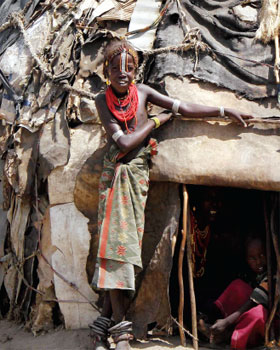By Ali Abdi
Everything is against them. Neighbours are their deadly enemies while the Government has forgotten them and the environment now threatens their very existence.
Marginalised within North Horr and the larger Marsabit County, the Daasanach, one of the smallest Kenyan tribes is crying out for justice, pleading with government and the international community to come to the people’s aid.
The Daasanach, who reside in Illeret village, claim that there is a deliberate move by their  |
Many Illeret villagers don’t have identification papers and this makes transacting any official business difficult. [Photo: George Mulala /Standard] |
"powerful" Gabra and Turkana neighbours to influence government officers not to give them national identity cards, without which they can’t vote or transact any business.
A few who have national IDs only brag of the old generation type that allowed them to vote in past general elections and the 2005 and 2010 referendums. But these have become obsolete and are no longer valid.
Snail pace
Longaiye Loitabua, 65, has been following up his retirement benefits from the Fisheries ministry for 12 years now. Because he still holds the old generation identity card, the conclusion of the transaction has been going on at snail pace.
"I was asked to get a new identity card. But I have not even managed to apply for it. No government official comes here and I cannot afford to travel to Marsabit town,’’ said the old man when The Standard team recently toured Illeret area with officers from the Marsabit Catholic Diocese.
Loitabua has four children and his first born, Keresa, 41, has no ID but the other three do — because they were lucky that when they were in high school Immigration officials issued students with the vital document.
"They got it while in secondary school in Marsabit town. Keresa applied for his ten years ago but he is yet to receive any communication about the process."
A neighbour, Nyaro Arilale, who was born in 1962 and did not vote in the 2010 referendum because officials said her old generation ID expired in 1997, is not, therefore, a registered voter. At Telesgaye village on the eastern shores of Lake Turkana, hundreds of locals say they feel they are not part of Kenya because there is nothing to identify them as Kenyans.
Alturat Korinyang, 54, who lost his ID in a house fire is yet to get a replacement he applied for in 1995.
Because of this, Korinyang cannot process his late brother’s benefits from the Ministry of Health.
"My brother worked as a nurse in Marsabit and I am his next of kin. The rest of the family have no ID and we cannot get the money,’’ he says.
Illeret Ward councillor Jennifer Lonyaman says about 6,000 of the Daasanach have IDs.
Ran short of forms
The community’s population, according to the 2009 National Census and the Independent Electoral and Boundary Commission is 9,790 and they occupy an area of 4,041square kilometres. But Lonyaman estimates that the community’s number is about 16,000. In the 2007 General Election, Illeret voters were 888.
"The enumerators ran short of forms by midday. The DC told us more forms would be sent and the exercise would be extended. Meanwhile, things were done on foolscaps. The promise was not honoured and the Daasanach were not counted," says Lonyaman.
But the vast North Horr/Chalbi District got its first office of Registrar of Persons last December and the department also lacks vehicles.
The registrar, Joseph Muchungu, says the office relies on other departments for a vehicle to move around the two districts.
He said the department had covered most areas in dealing with the problem and Illeret was next on their schedule where the problem of the Daasanach would be addressed.
As government officers, says Muchungu, they cannot deny Kenyans their rights.
Illeret has two primary schools — one is complete while the second one is up to Standard Four.
At Illeret Primary School that was started in 1969, records show that the last time a district education officer visited the school was 1989 while more than 90 per cent of children, especially girls, are out of school.
 The Standard Group Plc is a multi-media organization with investments in media
platforms spanning newspaper print operations, television, radio broadcasting,
digital and online services. The Standard Group is recognized as a leading
multi-media house in Kenya with a key influence in matters of national and
international interest.
The Standard Group Plc is a multi-media organization with investments in media
platforms spanning newspaper print operations, television, radio broadcasting,
digital and online services. The Standard Group is recognized as a leading
multi-media house in Kenya with a key influence in matters of national and
international interest.
 The Standard Group Plc is a multi-media organization with investments in media
platforms spanning newspaper print operations, television, radio broadcasting,
digital and online services. The Standard Group is recognized as a leading
multi-media house in Kenya with a key influence in matters of national and
international interest.
The Standard Group Plc is a multi-media organization with investments in media
platforms spanning newspaper print operations, television, radio broadcasting,
digital and online services. The Standard Group is recognized as a leading
multi-media house in Kenya with a key influence in matters of national and
international interest.










